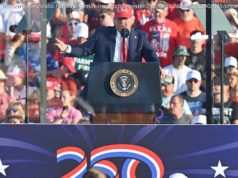The mass shooting at Marjory Stoneman Douglas High School shredded the lives of 17 families and forever impacted those of hundreds, perhaps thousands more. The public debate about why America has so…
The mass shooting at Marjory Stoneman Douglas High School shredded the lives of 17 families and forever impacted those of hundreds, perhaps thousands more. The public debate about why America has so many mass shootings, what can be done to stop or prevent them consisted of familiar – and predictably partisan — tropes from both sides in the larger debate about America’s relationship with guns.
To be sure, there is a time and place for a vigorous discussion about firearms and the Second Amendment. This may actually be that time. What the high school massacre in Parkland, Fla., brings into even starker relief, though, is the continual failure of our political institutions to forge consensus on any real issue.
Put aside action, for a moment. Today, the leaders of both political parties are unwilling to even compromise on guns — or any other pressing public policy issue. Asked by students and parents from Parkland to enact a ban on assault rifles, a Republican-controlled committee in the Florida legislature passed a measure to arm teachers. Tallahassee lawmakers wouldn’t even allow a relatively modest gun control measure to come up for a vote, defeating its introduction by a 2-1 margin.
Republicans are running scared in the face of NRA threats, perceived and real, to their political health. Democrats are demanding action that they themselves wouldn’t take when they controlled both houses of Congress and had a Democrat in the White House during Barack Obama’s first two years as president.
While gun control now tops the list, it is far from the only pressing matter in which our elected representatives have abdicated their responsibility in favor of marking time till their inevitable re-election in primaries controlled by their party’s extremes and then general elections in gerrymandered districts.
After winning a second term in 2004, President George W. Bush proposed reforming the Social Security system. The issue was quickly buried, in bipartisan fashion, as no one on Capitol Hill was willing to touch the “third rail” of American politics.
When the Republicans retook Congress during Obama’s presidency, then-Budget Committee Chairman Paul Ryan suggested reforming entitlements. Democrats responded with demagoguery instead of negotiations. Rather than discussing the dire long-term fiscal realities of Social Security or Medicare or debating modest proposals such as raising the retirement age, they resorted to personal attacks and over-the-top simplifications.
It’s apparently easier for politicians to sponsor attack ads featuring wheelchair-bound grandmothers being pushed off cliffs than to engage in rational debate. Yet, anyone under the age of 45 knows that what Social Security and Medicare look like today is not what these programs will look like upon their retirement in 25 or 30 years. It’s actually the baby boomers who are pushing millennials off the metaphorical cliff.
Our education system, too, is ripe for massive reform and disruption – on behalf of America’s young people. Yet this debate, like the others, quickly breaks down into a war of teachers’ union talking points about the “corporatization” of our schools.
As we hurtle toward the November 2018 midterms, most Americans will have only two choices at the ballot box. Regardless of the outcome, neither one of them — Democrats nor Republicans — has demonstrated a commitment to honest debate, real change, or even a willingness to discuss new solutions to the issues confronting the majority of Americans.
If the Republicans hold on to the House and Senate, they will do all they can to push through a unified agenda ahead of the 2020 presidential election. If the Democrats take one or both Houses in November, their mission will be one of obstruction and investigation (not unlike the GOP circa 2011-2016) as they attempt to prepare the battlefield for their own presidential candidates.
And in all this jockeying, strategizing and spending, Americans who aren’t political activists will stand by and watch, and wonder why we can’t do better. We are at an inflection point in our political history. How long it will last is unknowable. Today, there is no better time for voters of all stripes to demand more and better options from their politics. What’s the worst that could happen?
The two parties have abandoned their traditional roles as broad-based coalitions that could and did work on behalf of the American people. It’s time we abandon them and begin the hard work of creating a new party for a new American majority – one devoted to honest and open debate and problem solving for the good of all of us.






